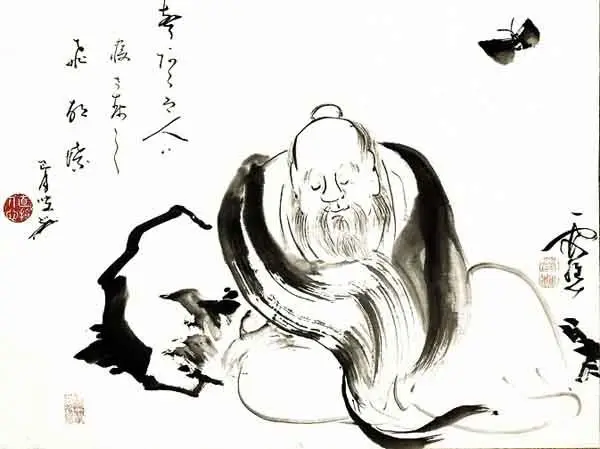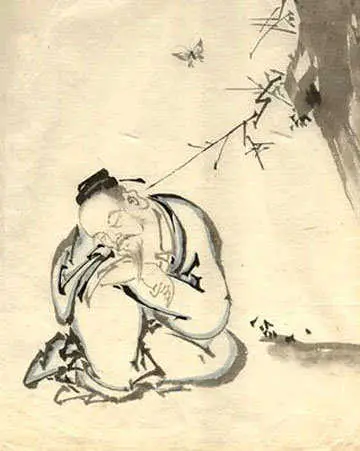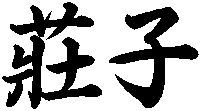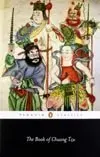|
Tao Te Ching
THE TAOISM OF LAO TZU
|
Chuang Tzu 33 The Taoist Text, Chapter 33
Thien Hsiâ.1. The methods employed in the regulation of the world are many; and (the employers of them) think each that the efficiency of his own method leaves nothing to be added to it.
But where is what was called of old "the method of the Tâo?" We must reply, "It is everywhere." But then whence does the spiritual in it come down? and whence does the intelligence in it come forth? There is that which gives birth to the Sage, and that which gives his perfection to the King:- the origin of both is the One. Not to be separate from his primal source constitutes what we call the Heavenly man; not to be separate from the essential nature thereof constitutes what we call the Spirit-like man; not to be separate from its real truth constitutes what we call the Perfect man. To regard Heaven as his primal Source, Its Attributes as the Root (of his nature), and the Tâo as the Gate (by which he enters into this inheritance), (knowing also) the prognostics given in change and transformation, constitutes what we call the Sagely man. To regard benevolence as (the source of all) kindness, righteousness as (the source of all) distinctions, propriety as (the rule of) all conduct, and music as (the idea of) all harmony, thus diffusing a fragrance of gentleness and goodness, constitutes what we call the Superior man. To regard laws as assigning the different (social) conditions, their names as the outward expression (of the social duties), the comparison of subjects as supplying the grounds of evidence, investigation as conducting to certainty, so that things can be numbered as first, second, third, fourth (and so on):- (this is the basis of government). Its hundred offices are thus arranged; business has its regular course; the great matters of clothes and food are provided for; cattle are fattened and looked after; the (government) stores are filled; the old and weak, orphans and solitaries, receive anxious consideration:- in all these ways is provision made for the nourishment of the people. How complete was (the operation of the Tâo) in the men of old! It made them the equals of spiritual beings, and subtle and all-embracing as heaven and earth. They nourished all things, and produced harmony all under heaven. Their beneficent influence reached to all classes of the people. They understood all fundamental principles, and followed them out to their graduated issues; in all the six directions went their penetration, and in the four quarters all things were open to them. Great and small, fine and coarse;- all felt their presence and operation. Their intelligence, as seen in all their regulations, was handed down from age to age in their old laws, and much of it was still to be found in the Historians. What of it was in the Shih, the Shû, the Lì, and the Yo, might be learned from the scholars of Tsâu and Lû, and the girdled members of the various courts. The Shih describes what should be the aim of the mind; the Shû, the course of events; the Lì is intended to direct the conduct; the Yo, to set forth harmony; the Yì, to show the action of the Yin and Yang; and the Khun Khiû, to display names and the duties belonging to them. Some of the regulations (of these men of old), scattered all under heaven, and established in our Middle states, are (also) occasionally mentioned and described in the writings of the different schools. There ensued great disorder in the world, and sages and worthies no longer shed their light on it. The Tâo and its characteristics ceased to be regarded as uniform. Many in different places got one glimpse of it, and plumed themselves on possessing it as a whole. They might be compared to the ear, the eye, the nose, or the mouth. Each sense has its own faculty, but their different faculties cannot be interchanged. So it was with the many branches of the various schools. Each had its peculiar excellence, and there was the time for the use of it; but notwithstanding no one covered or extended over the whole (range of truth). The case was that of the scholar of a corner who passes his judgment on all the beautiful in heaven and earth, discriminates the principles that underlie all things, and attempts to estimate the success arrived at by the ancients. Seldom is it that such an one can embrace all the beautiful in heaven and earth, or rightly estimate the ways of the spiritual and intelligent; and thus it was that the Tâo, which inwardly forms the sage and externally the king, became obscured and lost its clearness, became repressed and lost its development. Every one in the world did whatever he wished, and was the rule to himself. Alas! the various schools held on their several ways, and could not come back to the same point, nor agree together. The students of that later age unfortunately did not see the undivided purity of heaven and earth, and the great scheme of truth held by the ancients. The system of the Tâo was about to be torn in fragments all under a the sky.
Hwang-Tì had his Hsien-khih; Yâo, his Tâ Kang; Shun, his Tâ Shâo; Yü, his Tâ Hsiâ; Thang, his Tâ Hû; king Wan, his music of the Phi-yung; and king Wû and the duke of Kâu made the Wû. In the mourning rites of the ancients, the noble and mean had their several observances, the high and low their different degrees. The coffin of the Son of Heaven was sevenfold; of a feudal lord, fivefold; of a great officer, threefold; of other officers, twofold. But now Mo-tsze alone, would have no singing during life, and no wearing of mourning after death. As the rule for all, he would have a coffin of elaeococca wood, three inches thick, and without any enclosing shell. The teaching of such lessons cannot be regarded as affording a proof of his love for men; his practising them in his own case would certainly show that he did not love himself; but this has not been sufficient to overthrow the views of Mo-tsze. Notwithstanding, men will sing, and he condemns singing; men will wail, and he condemns wailing; men will express their joy, and he condemns such expression:- is this truly in accordance with man's nature? Through life toil, and at death niggardliness:- his way is one of great unkindliness. Causing men sorrow and melancholy, and difficult to be carried into practice, I fear it cannot be regarded as the way of a sage. Contrary to the minds of men everywhere, men will not endure it. Though Mo-tsze himself might be able to endure it, how can the aversion of the world to it be overcome? The world averse to it, it must be far from the way of the (ancient) kings. Mo-tsze, in praise of his views, said, "Anciently, when Yü was draining off the waters of the flood, he set free the channels of the Kiang and the Ho, and opened communications with them from the regions of the four Î and the nine provinces. The famous hills with which he dealt were 300, the branch streams were 3000, and the smaller ones innumerable. With his own hands he carried the sack and wielded the spade, till he had united all the streams of the country (conducting them to the sea). There was no hair left on his legs from the knee to the ankle. He bathed his hair in the violent wind, and combed it in the pelting rain, thus marking out the myriad states. Yü was a great sage, and thus he toiled in the service of the world." The effect of this is that in this later time most of the Mohists wear skins and dolychos cloth, with shoes of wood or twisted hemp, not stopping day or night, but considering such toiling on their part as their highest achievement. They say that he who cannot do this is acting contrary to the way of Yü, and not fit to be a Mohist. The disciples of Khin of Hsiang-lì, the followers of the various feudal lords; and Mohists of the south, such as Khû Hû, Ki Khih, and Tang Ling-tsze, all repeated the texts of Mo, but they differed in the objections which they offered to them, and in their deceitful glosses they called one another Mohists of different schools. They had their disputations, turning on "what was hard," and "what was white," what constituted "sameness" and what "difference," and their expressions about the difference between "the odd" and "the even," with which they answered one another. They regarded their most distinguished member as a sage, and wished to make him their chief, hoping that he would be handed down as such to future ages. To the present day these controversies are not determined. The idea of Mo Tì and Khin Hwa-lì was good, but their practice was wrong. They would have made the Mohists of future ages feel it necessary to toil themselves, till there was not a hair on their legs, and still be urging one another on; (thus producing a condition) superior indeed to disorder, but inferior to the result of good government. Nevertheless, Mo-tsze was indeed one of the best men in the world, which you may search without finding his equal. Decayed and worn (his person) might be, but he is not to be rejected,- a scholar of ability indeed!
When they heard of such ways, they were delighted with them. They made the Hwa-shan cap, and wore it as their distinguishing badge. In their intercourse with others, whatever their differences might be, they began by being indulgent to them. Their name for "the Forbearance of the Mind" was "the Action of the Mind." By the warmth of affection they sought the harmony of joy, and to blend together all within the four seas; and their wish was to plant this everywhere as the chief thing to be pursued. They endured insult without feeling it a disgrace; they sought to save the people from fighting; they forbade aggression and sought to hush the weapons of strife, to save their age from war. In this way they went everywhere, counselling the high and instructing the low. Though the world might not receive them, they only insisted on their object the more strongly, and would not abandon it. Hence it is said, "The high and the low might be weary of them, but they were strong to show themselves." Notwithstanding all this, they acted too much out of regard to others, and too little for themselves. It was as if they said, "What we request and wish is simply that there may be set down for us five pints of rice;- that will be enough." But I fear the Master would not get his fill from this; and the disciples, though famishing, would still have to be mindful of the world, and, never stopping day or night, have to say, "Is it necessary I should preserve my life? Shall I scheme how to exalt myself above the master, the saviour of the age?" It was moreover as if they said, "The superior man does not censoriously scrutinize (the faults of others); he does not borrow from others to supersede his own endeavours; when any think that he is of no use to the world, he knows that their intelligence is inferior to his own; he considers the prohibition of aggression and causing the disuse of arms to be an external achievement, and the making his own desires to be few and slight to be the internal triumph." Such was their discrimination between the great and the small, the subtle and the coarse; and with the attainment of this they stopped.
They knew that all things have what they can do and what they cannot do. Hence it is said, "If you select, you do not reach all; if you teach some things, you must omit the others; but the Tâo neglects none." Therefore Shan Tâo discarded his knowledge and also all thought of himself, acting only where he had no alternative, and pursued it as his course to be indifferent and pure in his dealings with others. He said that the best knowledge was to have no knowledge, and that if we had a little knowledge it was likely to prove a dangerous thing. Conscious of his unfitness, he undertook no charge, and laughed at those who valued ability and virtue. Remiss and evasive, he did nothing, and disallowed the greatest sages which the world had known. Now with a hammer, now with his hand, smoothing all corners, and breaking all bonds, he accommodated himself to all conditions. He disregarded right and wrong, his only concern being to avoid trouble; he learned nothing from the wise and thoughtful, and took no note of the succession of events, thinking only of carrying himself with a lofty disregard of everything. He went where he was pushed, and followed where he was led, like a whirling wind, like a feather tossed about, like the revolutions of a grindstone. What was the reason that he appeared thus complete, doing nothing wrong? that, whether in motion or at rest, he committed no error, and could be charged with no transgression? Creatures that have no knowledge are free from the troubles that arise from self-assertion and the entanglements that spring from the use of knowledge. Moving and at rest, they do not depart from their proper course, and all their life long they do not receive any praise. Hence (Shan Tâo) said, "Let me come to be like a creature without knowledge. Of what use are the (teachings of the) sages and worthies?" But a clod of earth never fails in the course (proper for it), and men of spirit and eminence laughed together at him, and said, "The way of Shan Tâo does not describe the conduct of living men; that it should be predicable only of the dead is strange indeed!" It was just the same with Thien Phien. He learned under Phang Mang, but it was as if he were not taught at all. The master of Phang Mang said, "The Tâoist professors of old came no farther than to say that nothing was absolutely right and nothing absolutely wrong." His spirit was like the breath of an opposing wind; how can it be described in words? But he was always contrary to (the views of) other men, which he would not bring together to view, and he did not escape shaving the corners and bonds (of which I have spoken). What he called the Tâo was not the true Tâo, and what he called the right was really the wrong. Phang Mang, Thien Phien, and Shan Tâo did not in fact know the Tâo; but nevertheless they had heard in a general way about it.
Kwan Yin says, "To him who does not dwell in himself the forms of things show themselves as they are. His movement is like that of water; his stillness is like that of a mirror; his response is like that of the echo. His tenuity makes him seem to be disappearing altogether; he is still as a clear (lake), harmonious in his association with others, and he counts gain as loss. He does not take precedence of others, but follows them." Lâo Tan says, "He knows his masculine power, but maintains his female weakness,- becoming the channel into which all streams flow. He knows his white purity, but keeps his disgrace,- becoming the valley of the world. Men all prefer to be first; he alone chooses to be last, saying, "I will receive the offscourings of the world." Men all choose fulness; he alone chooses emptiness. He does not store, and therefore he has a superabundance; he looks solitary, but has a multitude around him. In his conducting of himself he is easy and leisurely and wastes nothing. He does nothing, and laughs at the clever and ingenious. Men all seek for happiness, but he feels complete in his imperfect condition, and says, "Let me only escape blame." He regards what is deepest as his root, and what is most restrictive as his rule; and says, "The strong is broken; the sharp and pointed is blunted." He is always generous and forbearing with others, and does not encroach on any man;- this may be pronounced the height (of perfection)." 0 Kwan Yin, and Lâo Tan, ye were among the greatest men of antiquity; True men indeed!
Hui Shih by such sayings as these made himself very conspicuous throughout the kingdom, and was considered an able debater. All other debaters vied with one another and delighted in similar exhibitions. (They would say), "There are feathers in an egg." "A fowl has three feet." "The kingdom belongs to Ying." "A dog might have been (called) a sheep." "A tadpole has a tail." "Fire is not hot." "A mountain gives forth a voice." "A wheel does not tread on the ground." "The eye does not see." "The finger indicates, but needs not touch, (the object)." "Where you come to may not be the end." "The tortoise is longer than the snake." "The carpenter's square is not square." "A compass should not itself be round." "A chisel does not surround its handle." "The shadow of a flying bird does not (itself) move." "Swift as the arrowhead is, there is a time when it is neither fiying nor at rest." "A dog is not a hound." "A bay horse and a black ox are three." "A white dog is black." "A motherless colt never had a mother." "If from a stick a foot long you every day take the half of it, in a myriad ages it will not be exhausted."- It was in this way that the debaters responded to Hui Shih, all their lifetime, without coming to an end. Hwan Twan and Kung-sun Lung were true members of this class. By their specious representations they threw a glamour over men's minds and altered their ideas. They vanquished men in argument, but could not subdue their minds, only keeping them in the enclosure of their sophistry. Hui Shih daily used his own knowledge and the arguments of others to propose strange theses to all debaters;- such was his practice. At the same time he would talk freely of himself, thinking himself the ablest among them, and saying, "In heaven or earth who is my match?" Shih maintained indeed his masculine energy, but he had not the art (of controversy).
In the south there was a man of extraordinary views, named Hwang Liâo, who asked him how it was that the sky did not fall nor the earth sink, and what was the cause of wind, rain, and the thunder's roll and crash. Shih made no attempt to evade the questions, and answered him without any exercise of thought, talking about all things, without pause, on and on without end; yet still thinking that his words were few, and adding to them the strangest observations. He thought that to contradict others was a real triumph, and wished to make himself famous by overcoming them; and on this account he was not liked by the multitude of debaters. He was weak in real attainment, though he might seem strong in comparison with others, and his way was narrow and dark. If we look at Hui Shih's ability from the standpoint of Heaven and Earth, it was only like the restless activity of a mosquito or gadfly; of what service was it to anything? To give its full development to any one capacity is a good thing, and he who does so is in the way to a higher estimation of the Tâo; but Hui Shih could find no rest for himself in doing this. He diffused himself over the world of things without satiety, till in the end he had only the reputation of being a skilful debater. Alas! Hui Shih, with all his talents, vast as they were, made nothing out; he pursued all subjects and never came back (with success). It was like silencing an echo by his shouting, or running a race with his shadow. Alas! 
Chuang Tzu
 The Book of Chuang TzuA modern translation of Chuang Tzu, by Martin Palmer and Elizabeth Breuilly.See the book at Amazon
About CookiesMy Other Websites:I Ching OnlineThe 64 hexagrams of the Chinese classic I Ching and what they mean in divination. Try it online for free.
Qi Energy ExercisesThe ancient Chinese life energy qi (chi) explained, with simple instructions on how to exercise it.
Life EnergyThe many ancient and modern life force beliefs all over the world explained and compared.
Taoismen på svenska
Other Books by Stefan StenuddClick the image to see the book at Amazon (paid link).
The Greek philosophers and what they thought about cosmology, myth, and the gods. |
 Tao Te Ching
Tao Te Ching Tao Quotes
Tao Quotes Fake Lao Tzu Quotes
Fake Lao Tzu Quotes Cosmos of the Ancients
Cosmos of the Ancients Qi — Increase Your Life Energy
Qi — Increase Your Life Energy Aikido Principles
Aikido Principles Life Energy Encyclopedia
Life Energy Encyclopedia Archetypes of Mythology
Archetypes of Mythology Stefan Stenudd
Stefan Stenudd